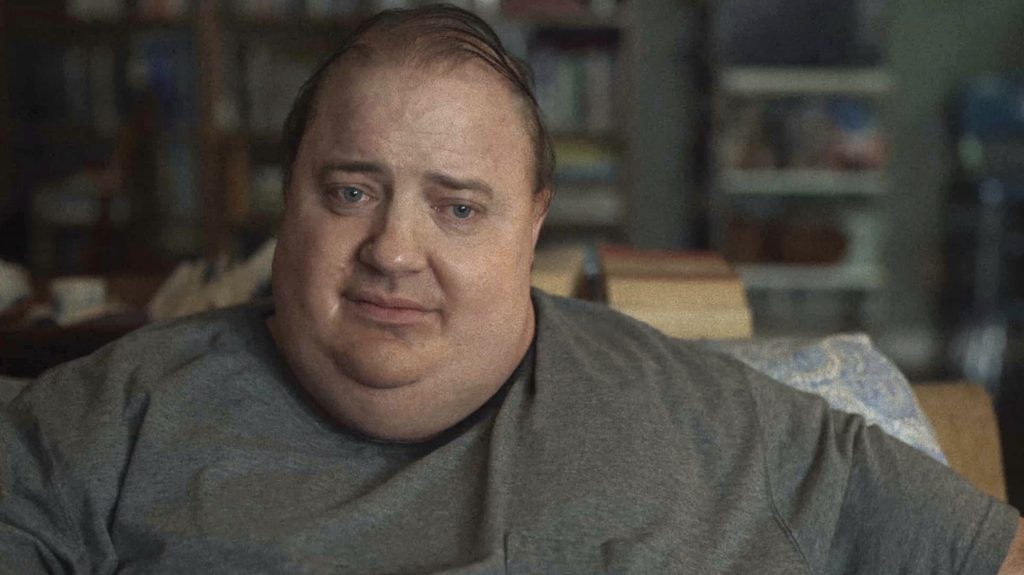Sometimes words become conflated without anyone asking their permission first. Champagne became the catch-all term for any sparkling white wine served at your cousin’s wedding. Their nacho cheese dipping fountain may have been “awesome,” but I doubt it inspired awe. And despite what Alanis Morissette says, rain on your wedding day is more unfortunate than ironic.
Darren Aronofsky’s latest film “The Whale” (in theaters Dec. 9) is all about these smeared definitions. It isn’t a vanity of small differences between love and salvation, or sympathy and empathy. The distance between East and West Berlin was slight too, but heaven help if you fell in-between.
The movie follows Charlie, a morbidly obese online professor mourning the loss of his partner. Charlie’s coping mechanism is food, and as we watch him devour his third pizza of the night, we realize we’re witnessing a suicide in slow motion. Charlie is played by the great Brendan Fraser in a generous performance, so generous it should save any other nominees in the Best Actor category from thinking of wasting gas fare to the Oscars.
Charlie’s condition leaves him largely immobile and the film follows suit, never straying beyond the confines of his apartment. The only other characters we see are the ones who visit him, including his estranged daughter, Ellie (Sadie Sink), Christian missionary Thomas (Ty Simpkins), and Liz (Hong Chau), sister of his late partner and the only nurse he will tolerate.
The latter bears bad news, as Charlie has become the first man to fail a blood pressure test. The film is framed as a Passion Play, following a man who approaches his final week on earth with clear-eyed focus. Jesus wrecked the Temple in his final week; Charlie recognizes that the body is a temple and settles for that.
All of Charlie’s visitors — and Charlie — struggle with the question that has haunted philosophers and Roxbury guys since the dawn of time: What exactly is love? Each is convinced of their own definition. And each, as the saying goes, are feeling different parts of the elephant.
Thomas is a missionary for New Life Church, one of those denominations that seem set on tricking you into thinking they’re a coffee shop. He means well, but he doesn’t understand that a man set on killing himself isn’t all that interested in getting saved. And Thomas is certainly kind: He is one of the few to react to Charlie’s condition without open disgust and assists him where he can.
But his is an abstract affection. Thomas and his church love past their subjects, more interested in what they can become than what they already are. We are reminded of Lady Marchmain in “Brideshead Revisited,” whose suffocating love pushes most of her children deeper into their follies.
Charlie takes most of the proselytizing in good humor, until Thomas insists that he renounce his previous relationship entirely to be saved. Charlie cannot and will not pretend he never loved his boyfriend. If his grief is killing him, it’s also been the only thing keeping him alive. Both Charlie and Thomas confuse love and salvation for one another, but from opposite ends. Thomas thinks that love is only shown through saving others, and Charlie thinks that love is all the salvation he needs, even when it’s killing him.
His nurse, Liz, is more openly hostile to Thomas, albeit for understandable reasons. She was the daughter of a minister from New Life and blames the church for driving her brother to his early end. Liz believes in works, not faith. She does all the dirty work of keeping Charlie alive, running tests and procuring the accessories necessary for him to simply continue. But Liz is also the source of most of Charlie’s junk food, dropping off meatball subs when broken glass would prove a healthier, if crunchier, alternative.
For Liz, love is codependency. Her self-sacrifice is beautiful, but so was “Nearer My God to Thee” on the deck of the Titanic. Both Liz and Thomas pity Charlie, which isn’t the same as caring for him.

Barreling through these schools of thought is Ellie. She remains furious at her father for abandoning her and her mother, and the world becomes an innocent bystander to that wrath. Charlie’s ex-wife admits to him that she believes Ellie is evil, and not just with the casual malevolence we accept in most teen girls.
Ellie is a bully, settling for social media if she can’t insult you directly to your face. But as Graham Greene once noted, the opposite of love isn’t hate, but indifference. Ellie’s love thrashes out with feral fury, like a drowning woman taking her rescuer down with her. She has associated love with pain for so long she doesn’t bother with the difference.
If there is ever a solution to love, it is found with Charlie himself. He’s an incurable optimist, an odd trait for a man courting death. As his ex-wife lists off the litany of Ellie’s crimes, he finds an explanation for each one, some straining credulity. But as Paul reminds us in Corinthians, “love bears all things, believes all things, hopes all things, endures all things.”
He often recites an essay on “Moby Dick” throughout the film, which he insists is the best he’s read in his teaching career. The snippets we hear aren’t promising, mostly just juvenile dismissals of Melville. We find out later it was written by Ellie. Of course it was written by Ellie.
But through his repetition, those passages become a mantra and their rough-hewn beauty finally takes shape. If there is a boundary between love and salvation, or sympathy and empathy, there is no such distinction between love and faith. Charlie treasures his daughter, despite or perhaps because he lacks any evidence for it. This is Christlike love; finding worth where there is none and reading depth into our hollowness, until we’re surprised to find that maybe there was something there after all.

